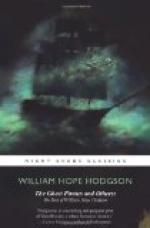The other man interrupted with some remark I did not catch.
“No,” I heard Stubbins say. “I’m hout of my reckonin’. I don’t savvy it one bit. It’s too much like a damned fairy tale.”
“Look at his wrist!” I said.
Tom held out his right hand and arm for inspection. It was considerably swollen where the rope had been round it.
“Yes,” admitted Stubbins. “That’s right enough; but it don’t tell you nothin’.”
I made no reply. As Stubbins said, it told you “nothin’.” And there I let it drop. Yet, I have told you this, as showing how the matter was regarded in the fo’cas’le. Still, it did not occupy our minds very long; for, as I have said, there were further developments.
The three following nights passed quietly; and then, on the fourth, all those curious signs and hints culminated suddenly in something extraordinarily grim. Yet, everything had been so subtle and intangible, and, indeed, so was the affair itself, that only those who had actually come in touch with the invading fear, seemed really capable of comprehending the terror of the thing. The men, for the most part, began to say the ship was unlucky, and, of course, as usual! there was some talk of there being a Jonah in the ship. Still, I cannot say that none of the men realised there was anything horrible and frightening in it all; for I am sure that some did, a little; and I think Stubbins was certainly one of them; though I feel certain that he did not, at that time, you know, grasp a quarter of the real significance that underlay the several queer matters that had disturbed our nights. He seemed to fail, somehow, to grasp the element of personal danger that, to me, was already plain. He lacked sufficient imagination, I suppose, to piece the things together—to trace the natural sequence of the events, and their development. Yet I must not forget, of course, that he had no knowledge of those two first incidents. If he had, perhaps he might have stood where I did. As it was, he had not seemed to reach out at all, you know, not even in the matter of Tom and the fore royal. Now, however, after the thing I am about to tell you, he seemed to see a little way into the darkness, and realise possibilities.
I remember the fourth night, well. It was a clear, star-lit, moonless sort of night: at least, I think there was no moon; or, at any rate, the moon could have been little more than a thin crescent, for it was near the dark time.
The wind had breezed up a bit; but still remained steady. We were slipping along at about six or seven knots an hour. It was our middle watch on deck, and the ship was full of the blow and hum of the wind aloft. Williams and I were the only ones about the maindeck. He was leaning over the weather pin-rail, smoking; while I was pacing up and down, between him and the fore hatch. Stubbins was on the look-out.
Two bells had gone some minutes, and I was wishing to goodness that it was eight, and time to turn-in. Suddenly, overhead, there sounded a sharp crack, like the report of a rifle shot. It was followed instantly by the rattle and crash of sailcloth thrashing in the wind.




